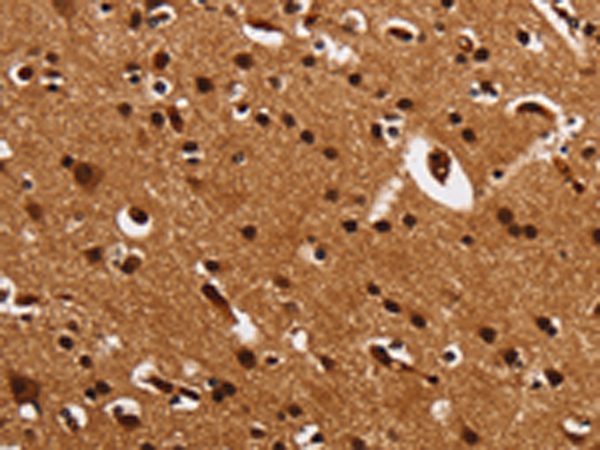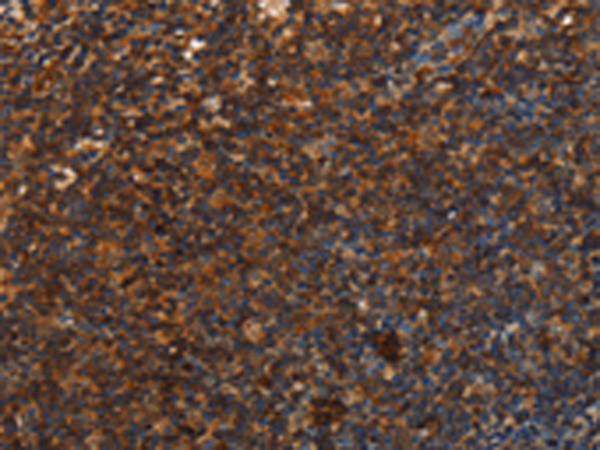


| WB | 1/500 - 1/2000 | Human,Mouse,Rat |
| IF | 咨询技术 | Human,Mouse,Rat |
| IHC | 1/200 - 1/1000 | Human,Mouse,Rat |
| ICC | 技术咨询 | Human,Mouse,Rat |
| FCM | 1/200 - 1/400 | Human,Mouse,Rat |
| Elisa | 1/10000 | Human,Mouse,Rat |
| Aliases | FLJ32198, MGC10902, p35, UPIIIb |
| WB Predicted band size | 34 kDa |
| Host/Isotype | Rabbit IgG |
| Antibody Type | Primary antibody |
| Storage | Store at 4°C short term. Aliquot and store at -20°C long term. Avoid freeze/thaw cycles. |
| Species Reactivity | Human |
| Immunogen | Fusion protein of human UPK3B |
| Formulation | Purified antibody in PBS with 0.05% sodium azide and 50% glycerol. |
+ +
以下是3篇与XRCC1抗体相关的文献摘要信息,供参考:
1. **"XRCC1 interacts with the human DNA repair enzyme PARP and stimulates its activity after DNA damage"**
*Author: Kubota Y. et al.*
摘要:研究通过免疫共沉淀和Western blot分析,利用XRCC1抗体揭示了XRCC1与PARP蛋白的相互作用,并证明XRCC1在DNA损伤后增强PARP酶活性,促进单链断裂修复。
2. **"Expression of XRCC1 and clinicopathological parameters in breast cancer"**
*Author: Abdel-Fatah T.M. et al.*
摘要:通过免疫组化(使用XRCC1特异性抗体)分析乳腺癌组织中XRCC1蛋白表达水平,发现低表达与患者预后不良及化疗耐药性相关,提示其作为潜在生物标志物的价值。
3. **"XRCC1 deficiency increases DNA damage and alters genomic stability in human cells"**
*Author: Thompson L.H. et al.*
摘要:利用XRCC1抗体进行细胞定位和功能研究,发现XRCC1缺失导致DNA损伤修复能力下降,染色体畸变率升高,证实其在维持基因组稳定性中的关键作用。
注:以上文献为示例性概括,实际引用时建议通过PubMed或Web of Science检索最新研究,并核对原文细节。
The XRCC1 (X-ray repair cross-complementing protein 1) antibody is a crucial tool for studying DNA repair mechanisms, particularly base excision repair (BER) and single-strand break repair (SSBR). XRCC1 is a scaffold protein that lacks enzymatic activity but coordinates key repair components, including DNA ligase IIIα, PARP1. and polynucleotide kinase, to maintain genomic stability. Antibodies targeting XRCC1 are widely used in research to detect its expression, localization, and interaction partners in various biological contexts. They are employed in techniques such as Western blotting (WB), immunohistochemistry (IHC), and immunofluorescence (IF) to investigate XRCC1’s role in cellular responses to DNA damage induced by radiation, oxidative stress, or chemotherapeutic agents.
XRCC1 antibodies are typically raised in rabbits or mice using immunogenic peptides or recombinant protein fragments, with monoclonal and polyclonal variants available. These antibodies help elucidate XRCC1’s involvement in diseases linked to defective DNA repair, including cancer, neurodegenerative disorders, and aging-related pathologies. For example, reduced XRCC1 expression or polymorphisms in its gene have been associated with increased cancer susceptibility. Researchers also use these antibodies to explore XRCC1’s potential as a biomarker for predicting therapeutic responses or prognosis in patients undergoing DNA-damaging treatments. Validation via knockout cell lines or siRNA knockdown is critical to ensure antibody specificity due to XRCC1’s complex protein interactions.
×